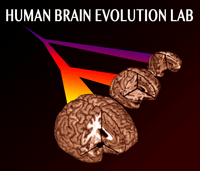Classes
I have taught the following courses over my career:
Undergraduate courses:
Introduction to Anthropology
Introduction to Biological AnthropologyHuman Origins and Prehistory
Introduction to Evolution of the Human Brain
Evolution of Behavior
Human Variation and Adaptation
Human Evolution
Issues in Hominid Evolution
Language and Society
Psychological Anthropology
Graduate courses:
Evolutionary Theory
Language Evolution
Brain Evolution
Cognitive Evolution
Perspectives on the Evolution of Human Behavior
Selected course descriptions:
Introduction to Anthropology
A survey of anthropology that introduces the fundamental concepts and perspectives of the field. It reviews the basics of biological anthropology, archeology, cultural anthropology and linguistics
Introduction to Biological Anthropology
This course introduces students to the study of human evolution as it is practiced by the various sub-disciplines of biological anthropology. We will take particular interest in current issues and problems in the field, and the different ways in which researchers are attempting to understand and uncover the details of human evolution. The areas of inquiry we will look at include: Human paleontology, human biology, primatology, molecular anthropology, human paleoneurology, and general issues in evolutionary biology. Some specific topics we will cover include: Phylogenetic reconstruction, reconstructing behavior from fossil remains, brain and behavior in an evolutionary perspective, important discoveries in human and primate paleontology, origin of anatomically modern humans, the role of diet in human evolution, and the evolution of language.
Human Origins and Prehistory
This course is an introduction to the study of human evolution. The focus will be on behavior: What do we know about how our ancestors lived their lives, and how did their behavior change over time? We will also emphasize how we come to know what we think we know about our origins and prehistory. This knowledge derives essentially from scientific detective work, in which clues are uncovered from many different sources. Fossils of our ancestors are one such source, but we have also learned a great deal by studying the tools they made and the marks these tools have left behind, the remains of other life forms that were alive at the same times as our ancestors, the geologic deposits all these clues are found in, our DNA and the DNA of closely related species, the behavior of modern primates and modern hunter-gatherers. The course will start with a review of the basics of how evolution works. We will then discuss primates and find out where humans fit within this interesting group of species. The fossil record 1 of our evolutionary history will be reviewed, as well as the archaeological remains of our ancestors - from the earliest stone tools to the introduction of agriculture and the emergence of cities and states. Some specific topics we will discuss include the origins of upright walking, when our brains got big (and why), the origins of language, when and where the first people like ourselves appeared, when the earliest evidence of art, the role of diet in human evolution, and why there is so much variation among humans living today. Ultimately we will show that an evolutionary perspective is critical to understanding who we are today.
Evolution of the Human Brain
An introduction to the study of the evolution of the brain, with a focus on the human species. Students will review basic concepts in evolutionary biology that form the basis for an evolutionary approach. The direct fossil evidence of vertebrate brain evolution will then be reviewed, and comparative (cross-species) perspectives on neuroanatomy and behavior will be emphasized. An analysis of the specific changes in the brain during human evolution will then be covered. We will consider possible sources of evidence relevant to brain evolution as well, such as the archaeological record of human behavioral evolution. Current controversies and theories about the causes and consequences of hominid brain evolution will be reviewed, including the possible role of language, tool use, sociality, dietary shifts, and other behavioral adaptations. In addition, sex differences in brain and behavior will be discussed, as well as philosophical questions surrounding the problems of consciousness, mind and brain. A consideration will also be given to the possible origins of human ethics and morals.
Human Variation and Adaptation
This course focuses on the strategies and approaches of biological anthropology to the question of human variation in contemporary populations. Particular interest given to the interaction of biology and culture. Part of the course will be devoted to delineating and understanding the extent, evolution, and importance of human variation. We will be exploring the inter-relatedness of biology and the environment (defined in the broadest possible sense). We will be interested in how humans survive with the many different ecological zones over the face of the earth. We will investigate human growth, various topics of special interest in human nutrition and medicine. Our focus will to show that human biology can best be appreciated from evolutionary and anthropological perspectives.
Evolution of Behavior
In this course we look at behavior from an evolutionary perspective, drawing on a variety of studies of both non-humans and humans. In particular, we will explore the extent to which our understanding of human behavior might be enhanced by knowing our evolutionary history. The focus will be on integrating biological and cultural influences into a more complete and useful understanding of ourselves. We will discuss a number of general topics, including sexuality, diet, cognition, cultural evolution, the evolution of hierarchy, consciousness, cognition, language, mental illness.
Psychological Anthropology
Cross-cultural comparison of theories of human nature, including psychoanalytic anthropology, culture-and- personality, and other theories from Western science, as well as non-Western theories about such concepts as the person, emotions, and mental illness.
Human Evolution
An overview of the fossil record and other evidence for human evolution. Discusses the emergence of the hominins as a lineage distinct from other apes. Provides evidence for the evolution of bipedalism, tool use, hunting/gathering, major increases in brain size, language, and material culture and the hypotheses that have been developed to explain the emergence of these characteristics.
Issues in Hominid Evolution
This seminar course surveys current topics of interest and controversy in hominid evolution, with a particular focus on the evolution of brain and cognition. Example of issues discussed will include: When, if ever, did hominid brains reorganize, and what is meant by this? What neuroanatomical changes occurred during hominid evolution, and how do we know? Is absolute or relative brain size more important for behavior? How and when did language evolve? Did Neanderthals speak? Why are there sex differences in spatial abilities? How important was hunting in human evolution? The course format will be informal. Students will be expected to lead class discussions on some topic of personal interest later in the course.
Language and Society
An examination of the social functions of speech through readings and exercises, emphasizing schools and other applied settings. Topics include ethnic and social class dialects, codeswitching, and the organization of conversation. Students will gain a greater appreciation for the ways in which language varies across time, across geography, and across social groupings such as social class, race/ethnicity, and sex/gender. Discussions of why this occurs, and what it says about the human condition, will also be central to the course.
Perspectives on the Evolution of Human Behavior
This seminar considers the evolution of cognitive skills from a variety of perspectives. One focus will be on hominid anatomical evolution, particularly those aspects relevant to the evolution of human behavior (e.g., neuroanatomy). Another focus will be on non-human primate behavior, both in the wild and in the lab. We will also consider the archaeological evidence left by Pleistocene humans that may be relevant to this question. Participants will have the opportunity to take an active role in influencing the direction of the seminar towards areas of their particular interest. The goal of the seminar will be to integrate research from many fields of inquiry in order to gain a better understanding of the human condition. Because this seminar will take a multidisciplinary approach, a strong background in anthropology will not be assumed.

